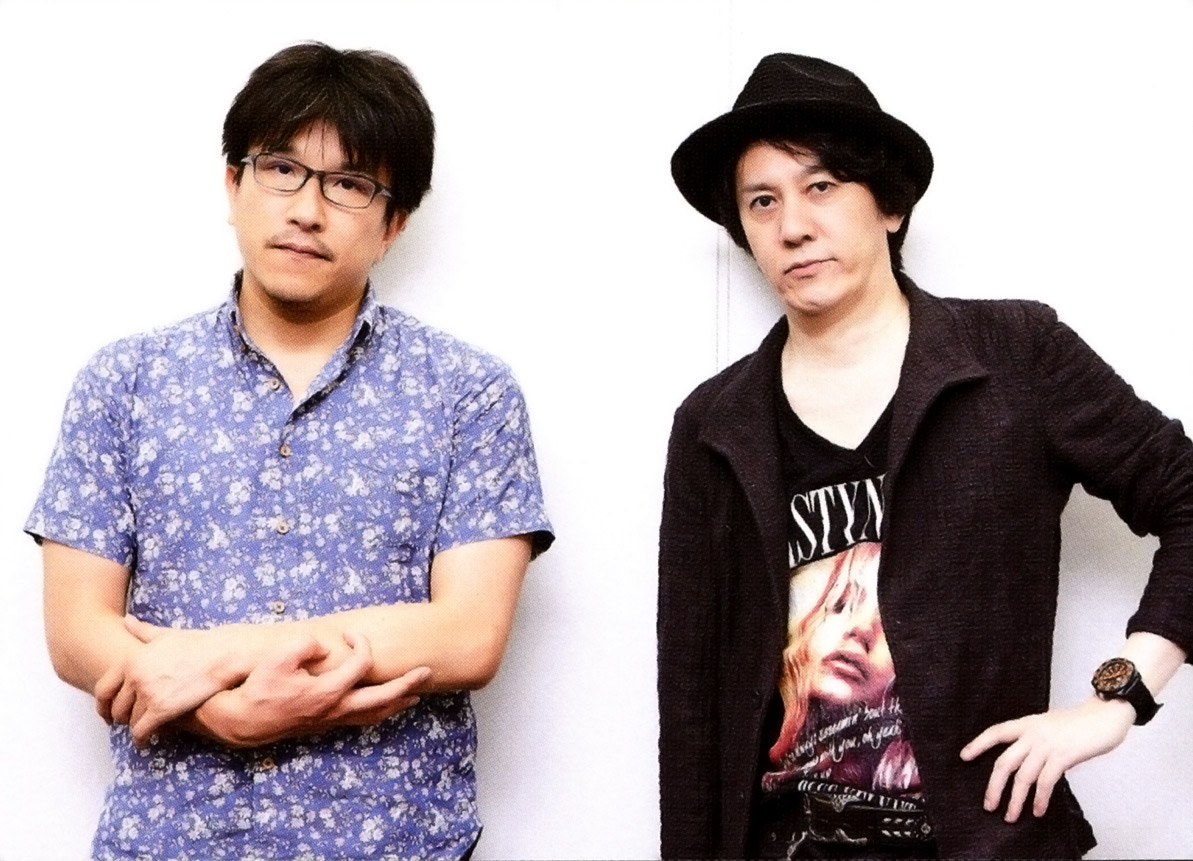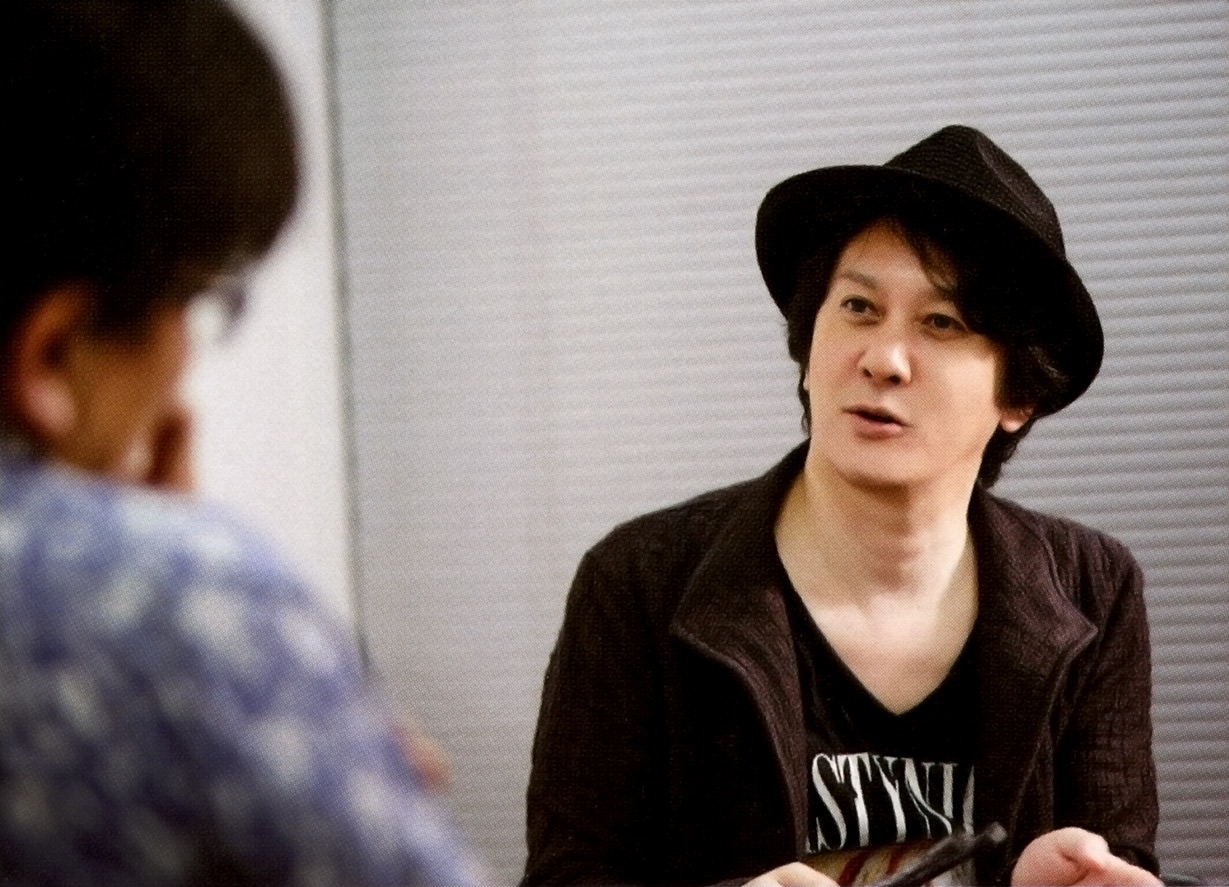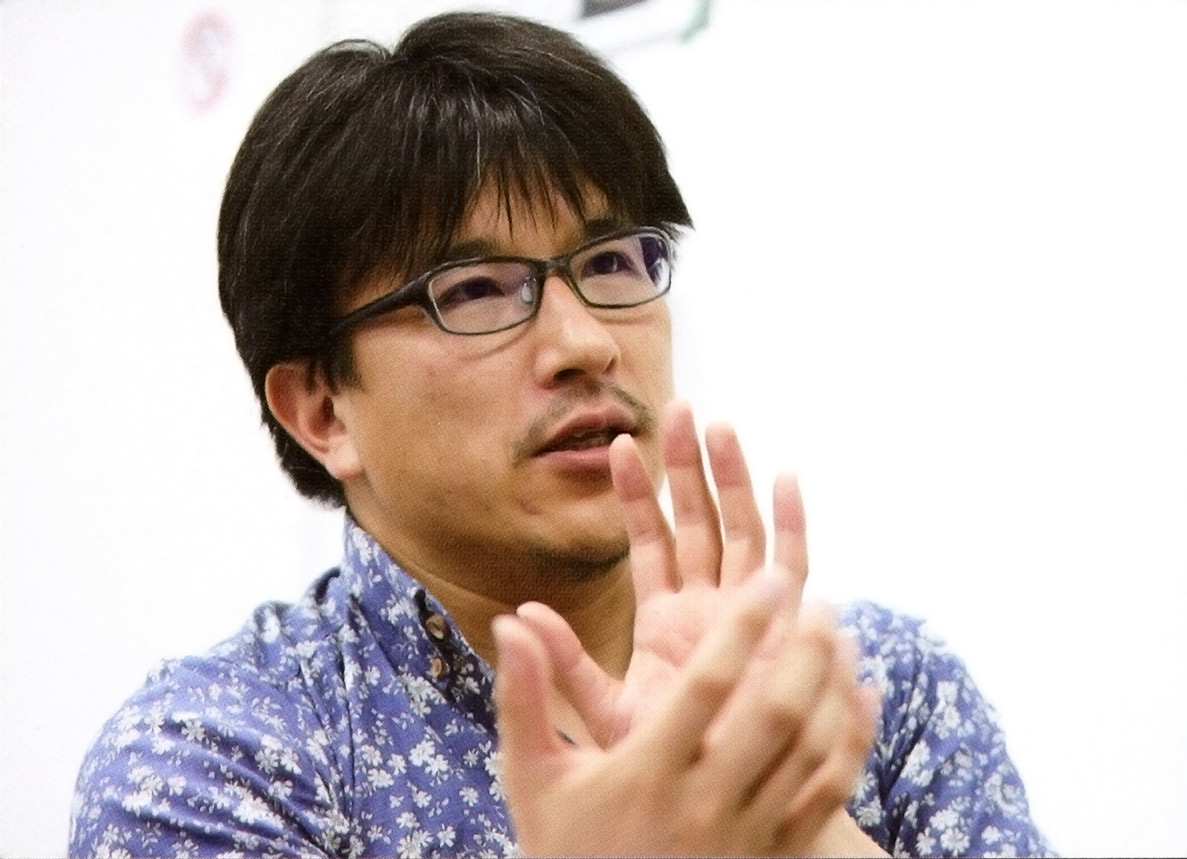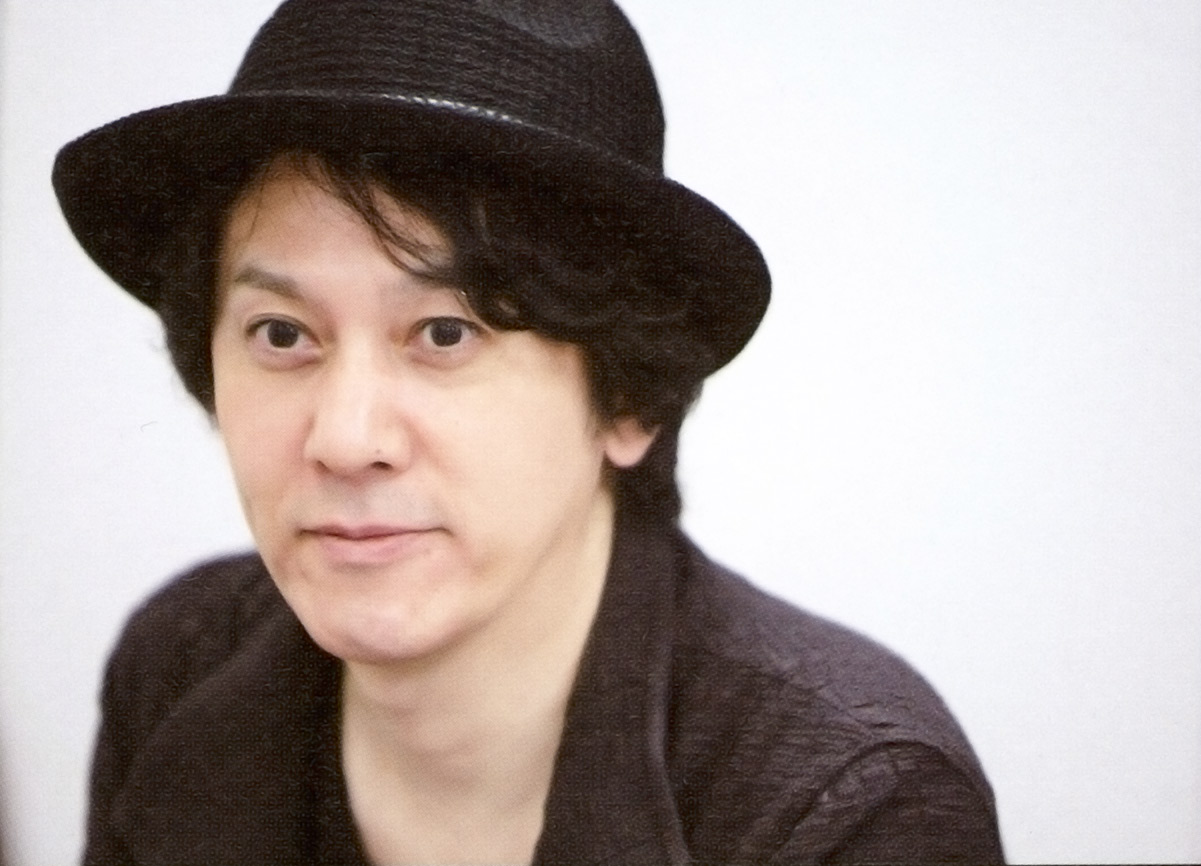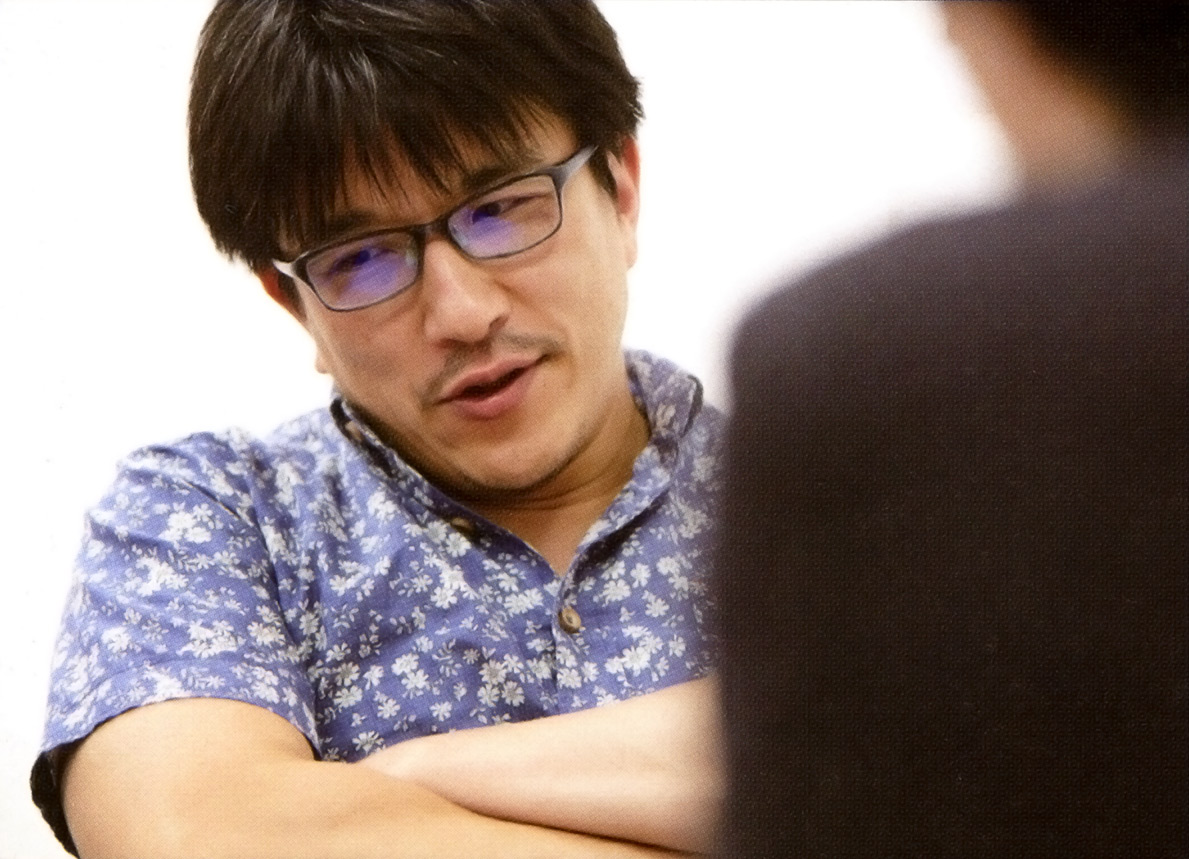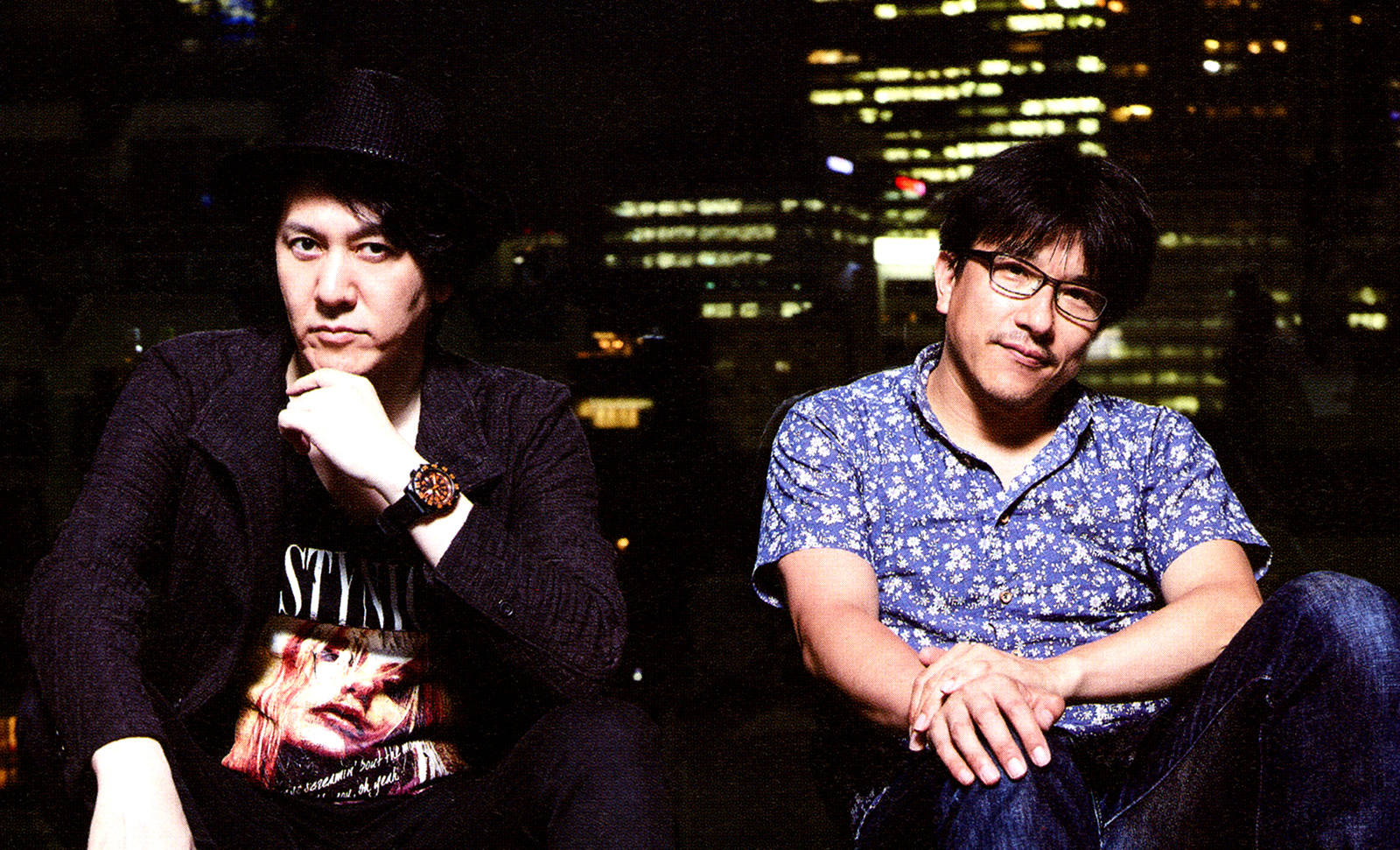[This was published in the 2019 Musical Utena ~ Blooming Rose of Deepest Black program book, purchased at the musical for 3000¥. The rest of the book has also been translated, and can be found in the gallery!]
[This amazing interview has been lovingly translated by Nagumo, with editing done by Ayu Ohseki, a pen, and Giovanna. Giovanna's coded it to mimic the appearance of the interview pages. Thank you so much for your work, Nagumo, Ayu Ohseki, and a pen!! I hope this attempt to bring the content to folks with the original aesthetic in mind does the work you've done here justice!! -Vanna ]
To commemorate the second Revolutionary Girl Utena musical, we once again welcome back Supervisor Ikuhara and Playwright and Director Yoshitani to discuss their dedication to and thoughts on the sequel.
Transforming the characters’ “passions” into visual horror (Ikuhara)
— You’ve adapted and condensed the entirety of the Black Rose Saga onto the stage as Revolutionary Girl Utena ~Blooming Rose of Deepest Black~. We’re holding this interview at night to invoke the work’s nocturnal vibe.Ikuhara: I was at the studio working towards my anime’s* climax, and before I knew it, night had snuck up on me. (laugh) I believe Yoshitani-san’s just come back from rehearsal today, as well.
*Ikuhara is talking about his 2019 anime, Sarazanmai.
Yoshitani: I’ve been at it non-stop. It wouldn't be an exaggeration to say that the Utena rehearsals have been the most exhausting. Really… I use my head a lot.
Ikuhara: Oh yeah?
Yoshitani: We wanted to show the audience how the relationships between characters intertwine, so there are many details to consider. Like, “here the characters should not just pass each other but also lock eyes,” or, “let’s have them circle each other first and then cross.” The ideas kept on coming and never stopped, even as we were putting the final touches on the production.
And this is the Black Rose Saga. So just as the quote, “Deeper... go deeper,” indicates, the story has more depth than the Student Council Saga. Isn't that right? It’s easy to say, “let’s make it deep,” but figuring out in a concrete way how to do that and coming up with the precise details of executing it was difficult, but also rewarding.
Ikuhara: The Black Rose Saga within the overall series is a bit of non-sequitur. We had already decided that the anime would have three Sagas*, starting with the Student Council Saga and ending with the Apocalypse Saga; we came up with the Black Rose Saga afterwards. There are many people who’ve said that the Black Rose Saga is their favorite, though. After the 2018 musical, I’ve been really looking forward to this follow-up stage adaptation— I just know having it done with a different “interpretation” from before will be great.
*The Apocalypse Saga, episodes 25-39, is often split into the 'Akio Arc,' 25-33, and the 'Apocalypse Arc,' 34-39. Most (but not all) official materials group the two chunks together, but in the fandom they're often split on the basis of episode 33 being a 'recap' episode that marks a significant shift in tone and content.
Even in the anime, the Student Council Saga had very Rococo-like visuals with a nuance of transforming heroes, whereas we did a 180° turn with the Black Rose Saga because we wanted to make it gothic horror. I was watching a lot of horror movies at the time, you see. Yes, these are works from an earlier generation, but I had the unique aspects of movies like The Exorcist, The Shining, and Suspiria in the forefront of my mind.
Yoshitani: Unlike our Supervisor, I’m not that great with horror movies. I’m actually quite a scaredy-cat. (laugh) But this time around, he clued me in to The Shining as being key, and so I took my time to carefully re-watch and re-examine it. There I found a beautifully artistic world unfolding before me.
Ikuhara: The Shining was such a ground-breaking film. It broke with usual tropes in how it portrayed ghosts. Many ghosts appear, of course, but what took me off-guard was the realization that, “Huh, they’re like normal human beings!?” What’s more, they don’t even realize it— there’s this scene where a ghost is surprised to discover that he’s a ghost. (laugh) Horror isn’t about having spectral spirits floating about or gallons of blood sploshing out. That’s why the Black Rose Saga is the way it is. I wanted to create a story where we transform the characters’ “passions” into visual horror.
Yoshitani: Simply put, when you think of horror, you think of ghosts. As such, the talk of "passion" was a big hint. On stage, you have no choice but to use actual living people; your performers can only exist as flesh-and-blood beings. At that point, you just have to accept that, without fear or hesitation.
But thanks to the influence of the new characters, it naturally became “Black Rose-like” (Yoshitani)
— This time the performance will be at Theatre G-Rosso. Last time, it was at CBGK Shibugeki!! Did the change make a difference in the creative process?Yoshitani: G Rosso is stadium-style, so the seating makes you look down onto the stage. I thought to myself, this is a worthy stage for the Black Rose Saga. Moreover, I thought it would be interesting to put Utena on a stage that usually puts on hero shows*.
*'Hero Shows' are tokusatsu or live action costume hero shows. Here are details on the theatre itself. The picture there shows that the seating is very steep as Yoshitani states. It is approximately 1,000 seats, versus the 2018 musical being shown in a much smaller, 250ish seat venue.
Ikuhara: It’s a much larger venue than the last one. I’d like to have Utena give a live Prog-Rock concert feel. I’ve asked they keep up what they did last time and let it go, “BOOM!” so I’m looking forward to the music.
Yoshitani: Our sound design team went, “We’ll put in lots more speakers than planned then!” and enthusiastically went at it. (laugh)
— Did you give the cast from the Student Council Saga any specific instructions because it’s now the Black Rose Saga?
Yoshitani: I tried my best not to. It would make them abnormally self-conscious about the atmosphere of the work, and they might be swallowed up by that. But thanks to the influence of the new characters, it naturally became ‘Black Rose-like.’ That’s the horror of it all. It's fun striking that balance where the characters within the play are unaware of the suspicious atmosphere, but the audience is growing increasingly uneasy about it.
In terms of composition, it’s a challenge because it’s the second Saga. Any sequel for a work suffers the same issue: that you have to balance the need to get new audience members up to speed without boring those who saw the first Saga. For this work, I tried to use that to my advantage. In the Black Rose Saga, the story is about the principal characters of the Student Council Saga having those most important to them become the Duelists. So just before the Duels in the Black Rose Saga, we showed the past Duels of the Student Council members. In this way, in addition to quickly promoting an understanding among first-time viewers, we created a way of capturing the essence of the Duelists. It might be quite an unusual solution, if I do say so myself.
— You've worked with Noujo-san, who plays Utena, for a year now. Do you feel she’s grown any?
Yoshitani: She’s gotten much better at action scenes. Same with how she carries herself; she’s much more confident with combat acting. It was quite the struggle at first for her to act out injuring someone with a weapon, which is hard for anyone. Now, though, she knows exactly how to portray that determination to fight, and I feel that that progress is evident in her work here.
— I heard that Yamauchi-san, who plays Anthy, is very actively speaking with the other cast members.
Yoshitani: Anthy is a character that you need to absorb many aspects of to bring to life. I believe that Yamauchi-san is well aware of this. This time it's been especially difficult figuring out what to do with Anthy. The Duelists are still after Anthy, but that doesn’t change the fact she’s a bystander. I already have a pretty specific image in mind of how this plays out, but even during rehearsal I still haven't finalized my thoughts. Hm, it’s complicated… Anthy, whatever shall we do? (Looks at Ikuhara.)
Both: (Laugh)
Ikuhara: Whatever shall we do? (laugh) Utena is a story where many types of siblings appear. There’s Miki and Kozue, and there’s Touga and Nanami... each pair is different. Being “inseparable” is one major motif, and that’s particularly easy to see with Miki and Kozue.
For them, their relationship seems frozen in time. Anthy and Akio’s relationship seems different from Miki and Kozue's at first glance, but 'the chosen girl' Utena comes between them and shakes it up... which is what the Apocalypse Saga is about. The Black Rose Saga foreshadows this story.
Yoshitani: Ah. I see, I see. As expected, it's only after this particular story is finished that we can finally see how Anthy truly felt about it. What you just said confirms it.
Mikage Souji is the Utena of the Night (Ikuhara)
Ikuhara: The Black Rose Saga is quite a meta-fictional story. Characters enter the confessional and admit, “I'm a side character, but to tell you the truth, I want to be the lead,” then challenge and duel the lead, i.e. Utena. People naturally think of side characters in anime as only that, so I felt these confessions would be an interesting surprise.Yoshitani: And what's more, we're putting that on stage. (laugh) It becomes quite meta; the more our actors play their part, the more that awareness “bubbles up” in their acting. No matter who it is, I want them to act out that impetus to be the main character during that moment in the spotlight.
— Previously the characters Kozue and Shiori were played by the ensemble, but this time they'll be performed by actual cast members, which is quite exciting.
Ikuhara: Shiori fans are particularly fanatical. Seems many people have strong feelings and opinions about her.
Yoshitani: Asakura-san, who plays Shiori, is a person who hates to lose in the best meaning of the word, so she really suits the role of Shiori. She’s insightful, expressive, and she’s got nerves of steel... Such high attack power. (laughs) She has you on the edge of your seat. Tanoue-san, who plays Kozue, gives off a mysterious aura that's very Kozue-like. They’re both very hardworking. During their independent rehearsals, they continuously practice with their swords.
Ikuhara: Personally, I'm excited for Mikage Souji, the last and best act of the Black Rose Saga.
Yoshitani: Our actor for Mikage, Tokuyama-san, gives a real good "last boss" feel. The more he comes to the fore, the more influence he has on Utena. Unwittingly, by his arrival into it, the world of the Black Rose Saga is born.
Ikuhara: We had made it a plot point from the very start in the anime that Mikage Souji was a ghost. When brainstorming for Utena, I watched a lot of Takarazuka performances with Saito Chiho-sensei. And one of those performances we watched was Elisabeth*.
* The Takarazuka production of this show happened in 1996, during the production of Utena, playing in Tokyo and also in Hyogo. It's likely Ikuhara and Saito went to one of these.
— You mean that musical that portrays the life of the Empress Elisabeth of Austria and her love and hate for the Sovereign of Death, Der Tod?
Ikuhara: The motifs found in Elisabeth come up in Utena constantly, and I thought, “Tod is a metaphor for ‘Death,’ but wouldn’t it be interesting if he doesn’t really realize that he is dead?” Like that one ghost in The Shining.
So he’s the one inciting everyone's passions, while looking like another Tenjou Utena. In a way, he's an “Utena of the Night,” trying to prove you can obtain "eternity."
By day, Ohtori Academy is the Palace of Versailles. But at night, it’s a haunted mansion made up of the lingering remnants of unattainable dreams— and though no one should be around, you can sense someone’s nearby. You know how in Japan, every school has rumors of being haunted? I wanted to incorporate that fearfulness. Then there’s Ohtori Akio, who claims dominion over day and night. I had the idea of Akio having that two-facedness in mind from the start.
Yoshitani: So you’re saying, rather than building the Black Rose Saga up based on the character relationships, the idea was, “Why don’t we try setting the school at night?”
Ikuhara: When we did it that way, we found many characters with lots of depth. Don't you find Utena an incredibly dazzling character?
The characters who interacted with that dazzling Utena began to show unexpected sides when they talked with the similarly pink-haired Mikage. Shiori, for example, was simply this cute-looking girl when the series started. But when I tried to develop Juri's story in the Black Rose Saga, I discovered I could draw out something different from the initial impression of Shiori. It was very exciting. When you watch Juri on her own, there's a part of her that feels like a parody, but the presence of Shiori brought out her humanity and gave her originality. Juri was perfected by Shiori's presence.
You’ve got to make sure you don’t get pulled too far into their stories... (Yoshitani)
Yoshitani: Even during rehearsal, watching Shiori and Juri's exchanges is quite fun. Anyway, it really makes me want to bully Juri. (laugh)This may be an unpleasant aspect of being a director, but Tatemichi-san is similar to Juri, the character she plays, in that she is a very straight-laced, rational person. So I got carried away with tripping her up and needling her. The more I tormented Juri, the more I felt sorry for her (laugh), so even in the main story, I try to cut her a break.
That's why for a moment, they might give off a will-they-won’t-they vibe...
Ikuhara: Juri and Shiori's relationship has an energy that makes you want to ask, "are they doing some kind of roleplay?" I love that part.
Yoshitani: The fact that Juri's feelings are not fulfilled gives me a sense of “c’est la vie,” and I also like how Juri’s unable to get over her love and ends up back at square one. Normally, if you consider it from the narrative’s perspective, it would be a cleaner ending to have her get over Shiori.
This is not limited to Juri. To create Utena, you’ve got to make sure you don’t get pulled too far into their stories. For example, if one considers the natural outcome that arises from theorizing about what happened to Chida Tokiko after she lost her younger brother, one ends up with a whole side drama or perhaps her own story. I believe it’s more important to work with the actress on imagining whether she has a child now, and if not, why, so we can firmly grasp Tokiko's present difficulties instead. One must focus not on the story but on the whirlwind of emotions and inexorable callousness of life.
Ikuhara: I just remembered another meta thing that I was thinking about at the time of the anime. I was wondering if I could use the world of the Black Rose Saga as a metaphorical representation of the lives of artists and creators.
— What do you mean?
Ikuhara: In short, everyone wants to be a star. However, not everyone can be a star. And then there are people who become stars without even realizing it.
People, for example, like Utena Tenjou.
It's not as if anyone can just become a star, so eventually it becomes a question of who can last in the dog-eat-dog world of being the star, and some will fail and exit. In such a world, Mikage Souji appears with the special power to make a person into a star. He fires up their passions and turns ordinary people into stars.
Yet Mikage himself is also bound by the word “eternity.” Here the word “eternity” is synonymous with “love.” Mikage thinks those who cannot become stars in the eyes of the masses won’t be able to carry on their “love.” He has come to believe that only a star can embody “love.”
But to embody a star who in turn embodies “love,” he needs a stage. Akio is the sponsor who puts his hand on Souji’s shoulder and whispers, “I’ve got the money you need.”
Yoshitani: So in terms of the stage, Mikage Souji is the director and Akio is the producer?
Ikuhara: I guess so. Whether a writer, director, actor, or celebrity, there are many whose passions make them radiant. Anyone can have such moments, but it’s an act that wears you down— it’s so tough to stay radiant through passion alone. At the same time, others will find this ambition highly sympathetic. This is because all humans have the desire to bask in the spotlight. Maybe the Black Rose Saga is so popular because we can project ourselves onto these characters who are burning with passion.
Yoshitani: So then, what is Mamiya's role in that world?
Ikuhara: So there are moments when Mikage is torn. Does he want to head to the world of passions without hesitation, or does he want to stay in the normal world? I feel Mamiya symbolizes what he should return to. After all, people can’t figure themselves out unless they face others.
Yoshitani: Ah-ha.
Ikuhara: Going back to the subject of natural stars, Saionji and Utena are actually cut from the same cloth. Meanwhile, Saionji is a star and Wakaba is an ordinary person.
The most interesting part of their episode is the tragedy of what happens when a star and a normal person live together. The star burns out, runs away, and hides out with a normal girl, but later someone from the agency comes and tells him, “it's time to get back to work”. Naturally, the girl is devastated.
Yoshitani: Saionji is like a star of the Showa era*. There is something comedic and silly about him.
* The Showa Era ran from 1926 to 1989; it is hard to know what sort of cultural zeitgeist or impression a star from that era is supposed to invoke in the context of this interview. It's likely referring to older and more macho masculinity tropes inherent in actors or men of the era.
Ikuhara: He lacks a sensitivity for what will hurt people (laughs), but this itself is a condition of being a star. A star is someone who only thinks about themselves, you see. Saionji is the pepper to Utena’s salt.
Yoshitani: And that's why it's so interesting to see Wakaba and Utena fight, isn't it?
A shockingly cruel one, like an extension of ourselves. (Ikuhara)
Yoshitani: Was it tough to make the Black Rose Saga?Ikuhara: It was tough. (laughs) Not just the Black Rose Saga, either... three seasons is physically draining.
Yoshitani: Wow, it must have been truly exhausting. When I'm making a play like this, the more I dig into the emotional side of things, the more I have to dig deep into my own heart, and the more my own ideas on creating it become clearer. It’s just like the man says: “Deeper, go deeper.” It all made sense to me when I heard the backstage details. Though I was wondering... why did 100 people have to be sacrificed?
Ikuhara: I thought a cruel story would be good. A shockingly cruel one, like an extension of ourselves.
Yoshitani: I used to think how unreasonable the episode where 100 boys were burned alive was, though it's the root of the Black Rose Saga. I mean, it’s so unfair that 100 boys were burned alive after pursing their work so diligently. But hearing that these were stars who didn’t make the cut*, I’ve changed my mind— it’s completely plausible.
* Translator's note: 芽が出なかった, literally means ‘shoots or buds that didn’t sprout.’
Ikuhara: The last one standing might just be Nanami. (laugh)
— Yoshitani-san, you seem very concerned about the “salvation” of the characters.
Ikuhara: I'm sure the actors are also concerned about that, like, “Where do their feelings end up at?” Naturally, Yoshitani-san is answering that question as he creates.
— Supervisor Ikuhara talked about “loss” in an interview after the first performance, but what about “salvation?”
Ikuhara: I don't know if I have any interest in that (laugh)... But I guess that’s what’s coming up next in the Apocalypse Saga.
Yoshitani: Ah yes, the Apocalypse Saga... If it gets greenlit for the stage, I bet I’ll go up another level. (laugh)
The fact that it can get done, by itself, makes me happy. (Ikuhara)
Ikuhara: This is true for the first musical too, but I feel that Yoshitani-san really picks up on what I’m talking about even though we don't have long meetings, both in terms of sound and visual presentation. I figured that since he’s already been asked to do this, I should just leave it up to him, so I only explained things halfway, but he really got what I was saying.Yoshitani: Maybe I'm taking it too seriously? (laughs) The way Supervisor Ikuhara imagines how to construct a scene is completely different from what I usually do. So when I listen to what he has to say, it's always a revelation; there are moments I go, “Ah!!” It's like I've been struck by lightning. Even things the Supervisor mentions casually are mind-blowing statements to me. That's how it is.
Ah! Speaking of, I had one real serious question today.
(They discuss a certain scene)
Yoshitani: Ahh... Now I get it.
— Is this how you usually converse?
Yoshitani: No, not at all. (laughs) Whenever I have a chance to meet with him, I always make sure to have a critical question ready to ask. I think I know what I'm doing, but there are times when I need specific answers. For example, during the first musical, the actor who played Miki asked me, "What is with the stopwatch?”
Both: (Laugh)
Yoshitani: I told him that it was “like a stabilizer that switches moods.”
Ikuhara: That's pretty much it. (laughs) "Youth is finite" and "worrying about time" are nuances I wanted to include in Utena. I was very aware that time moves and progresses as I created the story. And in the midst of all that, Mikage Souji remains stopped within that supposedly finite time.
Yoshitani: Back during the first musical, I was afraid to ask specific questions like this. How do I put it— I was afraid that if the details became too familiar, the world I’m trying to convey would become too narrow? But the Supervisor simply told me, “You don’t have to worry about that at all.”
Ikuhara: The actors are throwing themselves into the role, so it’s important for them to ask, “What is this line trying to say?” and, “What is it aiming to do?”
Even in anime, the voice actors are always wondering, “Why?” So I couldn’t be all, "I just want to do something mystifying."
I always prepared for that “why” and had constant discussions with everyone.
— Supervisor Ikuhara, please say a brief word about this play.
Ikuhara: Utena is a combination of Takarazuka Revue and the nuances of small-scale theater of the 60's and 70's, so it was inspired by the stage in the first place. That's why, as I mentioned in the last interview, when I was approached, I thought, “Nahh, it’s impossible. It'll never get anywhere.” But when I saw the Student Council Saga, I found it really interesting, partly because Mr. Yoshitani is so good... and partly because the times are the way they are, maybe. The fact that it can get done, by itself, makes me happy. In the Black Rose Saga, I'm looking forward to how the costumes will contribute to the darker aesthetic of what I think of as small theater.
Yoshitani: Thank you very much. My, but is it hard work. But it's fun because it's hard. (laugh)
— Looking forward to it!
